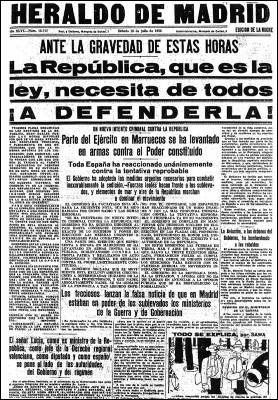A pronunciamiento is an uprising against the government, led by part of the army , and including a manifesto where those who rise up explain their criticism to the régime and their will of change. Those who rise up expect the people's adhesion to their cause. Examples of pronunciamientos could be Riego's uprsising in 1820, the 1854 pronunciamiento and the 1868 revolution.
Colonel Rafael del Riego
A coup d´État is an uprising of part of the army that uses force to overthrow the government and impose a new one. Coups d´État include the threat of use of considerable force against those who resist and they commonly mean overthrowing a legitimate government, elected by the citizens. Examples of coup d´État were General Elío's in 1814, when he led the army against the elected Cortes, Primo de Rivera's coup in 1923 or the July 1936 coup that provoked the Spanish Civil War.

No comments:
Post a Comment